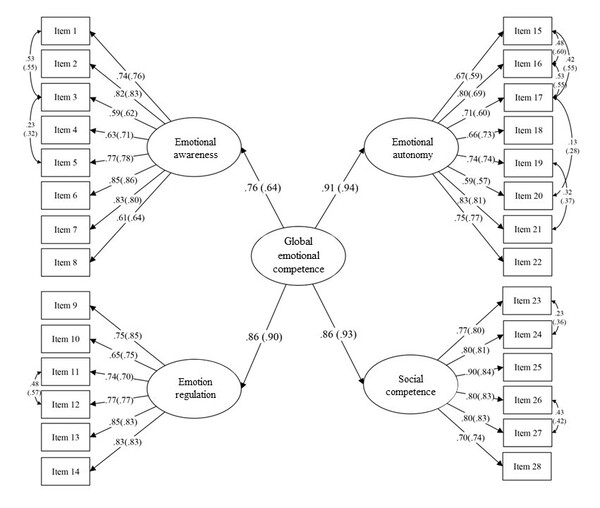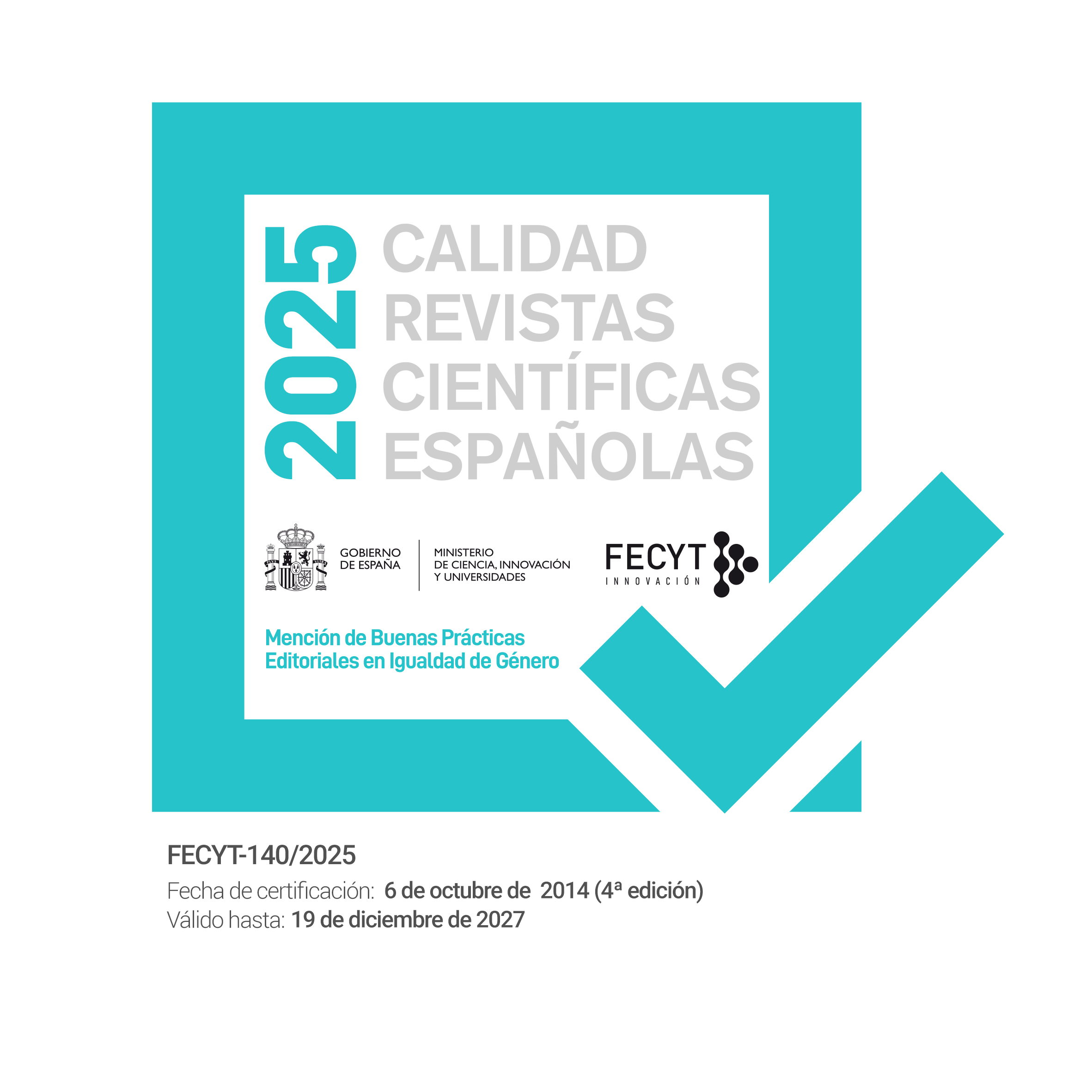Construction and validation of the emotional development on early primary education scale (EDEPES-28)
DOI:
https://doi.org/10.5944/educxx1.38358Keywords:
emotional competencies, emotion regulation, primary education, teachers, questionnaire development and validation, psychometric propertiesAbstract
While it is well-known that being emotionally competent contributes to improving the well-being and academic performance of students, there are few validated Spanish instruments that can assist teachers in assessing emotional competencies in early primary education children. In this study, we present the development and validation of the Emotional Development on Early Primary Education Scale (EDEPES) for students aged between 5 and 8 years. The study included a sample of 1113 students enrolled in the first and second grades of primary education in different educational centers in Spain. A preliminary version of the questionnaire with around 41 items was distributed, along with measures of anxiety (CAS) and academic performance (average score). These measures were taken at two time points with a 6-month interval. The results supported a 4-factor model of 28 items, comprising emotional competencies of emotional awareness, emotion regulation, emotional autonomy, and social competence, along with a higher-order factor to measure overall emotional competence. The EDEPES-28 demonstrated satisfactory reliability and criterion validity, showing significant associations with anxiety and academic performance. Furthermore, the results supported the assumptions of measurement invariance, revealing gender differences in both courses, with these distinctions being more pronounced in the second course, and girls obtaining higher scores. In conclusion, the EDEPES-28 proves to be a useful and easy-to-use instrument for teachers to assess the emotional competencies of early primary education students.
Downloads
References
Bartroli, M., Angulo-Brunet, A., Bosque-Prous, M., Clotas, C., & Espelt, A. (2022). The Emotional Competence Assessment Questionnaire (ECAQ) for children aged from 3 to 5 years: validity and reliability evidence. Education Sciences, 12, 489. https://doi.org/10.3390/educsci12070489
Bisquerra, R. (2020). Emociones: instrumentos de medición y evaluación. Síntesis.
Bisquerra, R., & Pérez-Escoda, N. (2007). Las competencias emocionales. Educación XX1, 10, 61-82.
Bisquerra Alzina, R., & Lopez Cassà, E. (2021). La evaluación en la educación emocional: instrumentos y recursos. Aula Abierta, 50(4), 757–766. https://doi.org/10.17811/rifie.50.4.2021.757-766
Buck, R. (1990). Rapport, emotional education, and emotional competence. Psychological Inquiry, 1(4), 301-302. https://doi.org/10.1207/s15327965pli0104_4
Chaplin, T. M., & Aldao, A. (2013). Gender differences in emotion expression in children: a meta-analytic review. Psychological Bulletin, 139(4), 735-765. https://doi.org/10.1037/a0030737
Cicchetti, D. V. (1994). Guidelines, criteria, and rules of thumb for evaluating normed and standardized assessment instruments in psychology. Psychological Assessment, 6, 284-290. https://doi.org/10.1037/1040-3590.6.4.284
Collaborative for the Advancement of Social and Emotional Learning. (2003). Safe and sound: An educational leader’s guide to evidence-based social and emotional learning (SEL) programs. ERIC Clearinghouse.
Davis, S. K., & Wigelsworth, M. (2018). Structural and predictive properties of the Emotional Quotient Inventory Youth Version–Short Form (EQ-i:YV[S]). Journal of Personality Assessment, 100(2), 197-206. https://doi.org/10.1080/00223891.2017.1280502
Di, M., Deng, X., Zhao, J., & Kong, F. (2022). Psychometric properties and measurement invariance across sex of the wong and law emotional intelligence scale in chinese adolescents. Psychological Reports, 125(1), 599-619. https://doi.org/10.1177/0033294120972634
Díaz-Lopez, A., Rubio-Hernández, F. J., & Carbonell-Bernal, N. (2019). Efectos de la aplicación de un programa de inteligencia emocional en la dinámica de bullying. Un estudio piloto. Journal of Psychology and Education, 14(2), 124-135. https://doi.org/10.23923/rpye2019.02.177
Domitrovich, C., Durlak, J., Staley, K., & Weissberg, R. (2017). Social-emotional competence: an essential factor for promoting positive adjustment and reducing risk in school children. Child Development, 88. https://doi.org/10.1111/cdev.12739
Durlak, J. A., Weissberg, R. P., Dymnicki, A. B., Taylor, R. D., & Schellinger, K. B. (2011). The impact of enhancing students’ social and emotional learning: a meta‐analysis of school‐based universal interventions. Child Development, 82(1), 405-432. https://doi.org/10.1111/j.1467-8624.2010.01564.x
Fernández-Berrocal, P., & Extremera, N. (2016). Ability emotional intelligence, depression, and well-being. Emotion Review, 8(4), 311-315. https://doi.org/10.1177/1754073916650494
Ferrándiz, C., Hernández-Torrano, D., Bermejo, R., Ferrando, M., & Sainz Gómez, M. (2012). Social and emotional intelligence in childhood and adolescence: Spanish validation of a measurement instrument. Revista de Psicodidáctica, 17, 309-338.
Filella, G., Morera, M. -J., Pérez-Escoda, N., & Granado, X. (2014). Resultados de la aplicación de un programa de educación emocional en educación primaria. Estudios sobre Educación, 26, 125-147. https://doi.org/10.15581/004.26.125-147
Gillis, J. S., Gómez Fernández, D. E., & Pulido García, M. T. (2011). CAS: Cuestionario de Ansiedad Infantil: manual. TEA Ediciones. https://bit.ly/3JhAbYx
Greenberg, M., Domitrovich, C., Weissberg, R., & Durlak, J. (2017). Social and emotional learning as a public health approach to education. Future of Children, 27, 13-32. https://doi.org/10.1353/foc.2017.0001
Hu, L., & Bentler, P. M. (1999). Cutoff criteria for fit indexes in covariance structure analysis: conventional criteria versus new alternatives. Structural Equation Modeling, 6, 1-55. https://doi.org/10.1080/10705519909540118
Huang, C., & Zeng, X. (2023). Social and emotional development of disadvantaged students and its relationship with academic performance: evidence from China. Frontiers in Psychology, 14, 1170656. https://doi.org/10.3389/fpsyg.2023.1170656.
Jordan, J.-A., McRorie, M., & Ewing, C. (2010). Gender differences in the role of emotional intelligence during the primary-secondary school transition. Emotional & Behavioural Difficulties, 15(1), 37-47. https://doi.org/10.1080/13632750903512415
López-Cassá, E. (2007). La educación emocional en el segundo ciclo de la educación infantil. Diseño, desarrollo y evaluación de un programa de educación emocional para la prevención y el desarrollo humano. [Tesis Doctoral]. Universitat de Barcelona (Barcelona).
López-Cassà, E., & Pérez-Escoda, N. (2022). La educación emocional: una necesidad para el bienestar personal y social. En N. Pérez-Escoda & E. López-Cassà (Eds.), Retos para el bienestar social y emocional (pp. 23-35). Wolters Kluwer.
Lozano, M. Y., & Hernández Arroyo, S. (2022). Emotional education in legislation: analysis based on minimum contents decrees from LOMLOE. HUMAN REVIEW. International Humanities Review / Revista Internacional De Humanidades, 13(2), 1–17. https://doi.org/10.37467/revhuman.v11.4023
Lorenzo-Seva, U. (2022). SOLOMON: a method for splitting a sample into equivalent subsamples in factor analysis. Behavior Research Methods, 54(6), 2665-2677. https://doi.org/10.3758/s13428-021-01750-y
MacCallum, R. C., Widaman, K. F., Zhang, S., & Hong, S. (1999). Sample size in factor analysis. Psychological Methods, 4, 84-99. https://doi.org/10.1037/1082-989X.4.1.84
Maccann, C., Jiang, Y., Brown, L., Double, K., Bucich, M., & Minbashian, A. (2019). Emotional intelligence predicts academic performance: a meta-analysis. Psychological Bulletin, 146. https://doi.org/10.1037/bul0000219
Maguire, L. K., Niens, U., McCann, M., & Connolly, P. (2016). Emotional development among early school-age children: gender differences in the role of problem behaviours. Educational Psychology, 36(8), 1408-1428. https://doi.org/10.1080/01443410.2015.1034090
Mathews, B., Koehn, A., Movahed Abtahi, M., & Kerns, K. (2016). Emotional competence and anxiety in childhood and adolescence: a meta-analytic review. Clinical Child and Family Psychology Review, 19. https://doi.org/10.1007/s10567-016-0204-3
Mavroveli, S., Petrides, K. V., Shove, C., & Whitehead, A. (2008). Investigation of the construct of trait emotional intelligence in children. European Child & Adolescent Psychiatry, 17(8), 516-526. https://doi.org/10.1007/s00787-008-0696-6
Mayer, J. D., Salovey, P., Caruso, D. R., & Sitarenios, G. (2003). Measuring emotional intelligence with the MSCEIT V2.0. Emotion, 3(1), 97-105. https://doi.org/10.1037/1528-3542.3.1.97
McDonald, R. P. (1999). Test theory: A unified treatment. Lawrence Erlbaum Associates Publishers.
McTaggart, V., McGill, R., & Stephens, S. (2022). Gender differences in the development of children’s social and emotional competencies during the pre-school year. Early Child Development and Care, 192(12), 1952-1966. https://doi.org/10.1080/03004430.2021.1957859
Petrides, K. V., & Furnham, A. (2001). Trait emotional intelligence: psychometric investigation with reference to established trait taxonomies. European Journal of Personality, 15(6), 425-448. https://doi.org/10.1002/per.416
Pérez-Escoda, N., & Filella, G. (2019). Educación emocional para el desarrollo de competencias emocionales en niños y adolescentes. Praxis & Saber, 10(24), 23-44. https://doi.org/10.19053/22160159.v10.n25.2019.8941
Pérez-González, J. C., Jiménez-Cantón, G., Rodríguez-Donaire, A., & Cejudo-Prado, J. (2022). Vademécum de la evaluación comprehensiva del aprendizaje social y emocional y de la inteligencia emocional. En N. Pérez-Escoda, & E. López-Cassà (Eds.), Retos para el bienestar social y emocional (pp. 247-271). Wolters Kluwer.
Pérez López, R., & Gómez Hurtado, I. (2021). Educando las emociones: investigación-acción sobre un programa de educación emocional para el alumnado de educación primaria. Investigación en la Escuela, 104, 13-28. http://dx.doi.org/10.12795/IE.2021.i104.02
Poulou, M. S., Grazzani, I., Cavioni, V., Ornaghi, V. M., Conte, E., Cefai, C., Camilerri, L., & Bartolo, P. (2022). Teachers’ and students’ changes in social and emotional competences following the implementation of PROMEHS: a European program for promoting mental health at schools. educational research applications. https://bit.ly/3TX92QK
Rivers, S., Brackett, M., Reyes, C., Mayer, J., Caruso, D., & Salovey, P. (2012). Measuring emotional intelligence in early adolescence with the MSCEIT-YV: psychometric properties and relationship with academic performance and psychosocial functioning. Journal of Psychoeducational Assessment, 30, 344-366. https://doi.org/10.1177/0734282912449443
Ros-Morente, A., Filella, G., Ribes, R., & Escoda, N. (2017). Análisis de la relación entre competencias emocionales, autoestima, clima de aula, rendimiento académico y nivel de bienestar en una muestra de escolares de educación primaria. REOP - Revista Española de Orientación y Psicopedagogía, 28, 8. https://doi.org/10.5944/reop.vol.28.num.1.2017.19355
Ruvalcaba Romero, N., Fernández-Berrocal, P., Salazar-Estrada, J., & Gallegos, J. (2017). Positive emotions, self-esteem, interpersonal relationships and social support as mediators between emotional intelligence and life satisfaction. Journal of Behavior, Health & Social Issues, 9. https://doi.org/10.1016/j.jbhsi.2017.08.001
Salovey, P., & Mayer, J. D. (1989). Emotional intelligence. Imagination, Cognition and Personality, 9(3), 185-211. https://doi.org/10.2190/DUGG-P24E-52WK-6CDG
Sanchis-Sanchis, A., Grau, M. D., Moliner, A. -R., & Morales-Murillo, C. P. (2020). Effects of age and gender in emotion regulation of children and adolescents. Frontiers in Psychology, 11. https://bit.ly/43zV3Dz
Schoeps, K., Tamarit, A., Postigo-Zegarra, S., & Montoya-Castilla, I. (2021). Los efectos a largo plazo de las competencias emocionales y la autoestima en los síntomas internalizantes en la adolescencia. Revista de Psicodidáctica, 26(2), 113-122. https://doi.org/10.1016/j.psicod.2020.12.001
Schultz, D., Trentacosta, C., Izard, C.E., Leaf, P., & Mostow, A. (2004). Children’s emotion processing: the development of the Assessment of Children’s Emotion Skills (ACES).
Sporzon, G., & López, M. C. (2021). Evaluación de la inteligencia emocional y la conducta prosocial y su correlación en alumnado de educación primaria. Estudios sobre Educación, 40, 51-73. https://doi.org/10.15581/004.40.51-73
Taber, K. (2018). The use of Cronbach’s alpha when developing and reporting research instruments in science education. Research in Science Education, 48, 1-24. https://doi.org/10.1007/s11165-016-9602-2
Taylor, R. D., Oberle, E., Durlak, J. A., & Weissberg, R. P. (2017). Promoting positive youth development through school-based social and emotional learning interventions: a meta-analysis of follow-up effects. Child Development, 88(4), 1156-1171. https://doi.org/10.1111/cdev.12864
Tottenham, N., Hare, T. A., & Casey, B. J. (2011). Behavioral assessment of emotion discrimination, emotion regulation, and cognitive control in childhood, adolescence, and adulthood. Frontiers in Psychology, 2, 39. https://doi.org/10.3389/fpsyg.2011.00039

Downloads
Published
Versions
- 2024-07-01 (2)
- 2024-06-28 (1)
How to Cite
Issue
Section
License
Copyright (c) 2024 María Priego Ojeda, Èlia López-Cassà, Núria Pérez-Escoda, Gemma Filella-Guiu

This work is licensed under a Creative Commons Attribution-NonCommercial 4.0 International License.
Educación XX1 is published under a Creative Commons Attribution-NonCommercial 4.0 (CC BY-NC 4.0)










